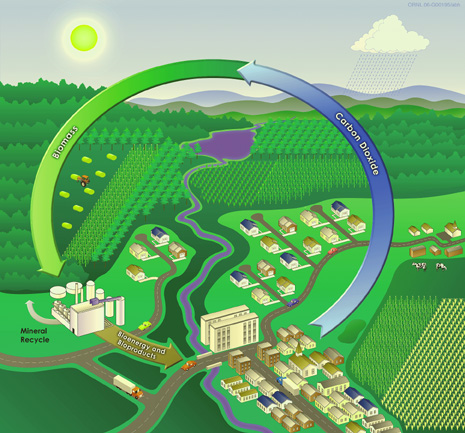The Greenhouse Gases, Regulated Emissions, and Energy Use in Transportation (GREET) model, developed by Argonne National Laboratory, has been used by government agencies, the auto industry, the energy industry, research institutions, universities, and public interest groups in the past to measure the emissions as defined above. The GREET model measures energy and emission impacts of advanced vehicle technologies and new transportation fuels from “wells to wheels.” The model can be applied to any fuel, and it measures the amount of energy and emissions from producing raw materials (e.g., growing biofuel feedstocks or drilling for oil), refining the raw material into fuel, distributing that fuel to fueling stations, and burning it in an automobile.
Carbon Dioxide Recycling with Biofuels

Dr. Michael Wang of Argonne has used the GREET model to compare greenhouse gas emissions of biofuels – considering many different production systems from the growing list – with those of gasoline. Wang posits that because growing agricultural feedstocks for biofuels captures carbon dioxide, biofuels can achieve significant reductions in greenhouse gases compared to fossil fuels. Other researchers have compared Wang’s results with the results of other models and concluded that biofuels do indeed reduce greenhouse gases compared with fossil fuels. For instance, the Energy Resources Group Biofuel Analysis Meta-Model (EBAMM) was developed by students and faculty of UC Berkeley to review the current state of biofuel energy analyses and was first published in Science on January 27, 2006.





Awesome pics. Those are very detailed!
[…] to the California Air Resources Board (CARB) today with comments on CARB’s current draft of a lifecycle analysis of sugarcane ethanol using the GREET-CA model. This modeling is done under the Low Carbon Fuel […]
I’ve made a wiki on climate change and energy, as well as policies of major nations and clean energy investments. It might be of interest to you as well. Have a look here: http://hotclimate.wikidot.com
[…] GHG Lifecycle […]